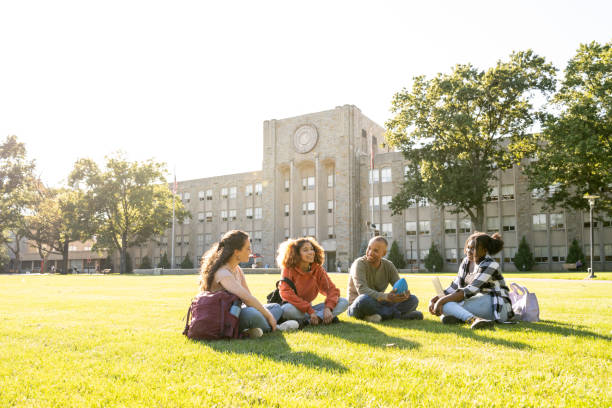
Campus years are often remembered for lectures, social nights and a sense of exploration. What is less often discussed is how the relationships formed during that time quietly shape careers long after graduation. The friendships, mentorships and casual connections you make on campus work in parallel with your academic efforts. They influence the opportunities you see, the choices you make and sometimes even the trajectory of an entire career. Thinking of campus networks as part of your professional formation changes how you approach friendships, group projects and the clubs you join.
Friendships formed in lecture halls and student common rooms carry more weight than many realize.
 Peers who studied with you through tough modules are the same people who later understand your strengths and weaknesses. When a job opening appears, a trusted friend is more likely to recommend you because they have seen how you perform under pressure. Those early bonds are often stronger than later professional ties because they were forged at a moment when everyone was learning and growing together. Investing in authentic friendships on campus pays back in referrals, partnership opportunities and emotional support during career transitions.
Peers who studied with you through tough modules are the same people who later understand your strengths and weaknesses. When a job opening appears, a trusted friend is more likely to recommend you because they have seen how you perform under pressure. Those early bonds are often stronger than later professional ties because they were forged at a moment when everyone was learning and growing together. Investing in authentic friendships on campus pays back in referrals, partnership opportunities and emotional support during career transitions.
Mentorship on campus functions as a soft form of sponsorship that cannot be bought. A tutor who notices potential in a student will often provide feedback, recommend readings and sometimes introduce them to employers or research supervisors. Senior students who take juniors under their wing offer practical tips about course selection, internships and the realities of certain industries. That kind of guidance short cuts years of trial and error. When a mentor writes a recommendation or makes a phone call on a student’s behalf, the result is not merely advice but access to networks that are otherwise hard to reach.
Romantic relationships on campus shape careers in quieter ways.

Partners who understand each other’s schedules and pressures can become crucial sources of emotional and practical support. Some university romances evolve into business partnerships where shared values and complementary skills create strong enterprises. At the same time students should be honest about the ways personal ties intersect with professional ambitions. Healthy relationships that encourage growth can be career accelerators. Relationships that require constant rescue work can distract from long term goals. Being intentional about boundaries and mutual support helps both personal life and professional development.
Group projects are often dismissed as academic chores but they are practice fields for professional collaboration.

Learning to distribute work, manage deadlines and resolve personality clashes teaches negotiation and leadership skills that employers look for. Students who consistently take responsibility in teams earn reputations that extend beyond grades. Those reputations translate into recommendations, invitations to collaborate on external projects and leadership roles in early careers. The small experiments with teamwork on campus are not trivial. They teach the social mechanics of work that matter in real job settings.
Clubs and societies expose students to people from different disciplines and backgrounds and they create bridges to unexpected opportunities. A person who joins an entrepreneurship club may meet a legal minded friend who later becomes the co founder of a startup. A member of a theatre group may build confidence and public speaking skills that are assets in interviews and presentations. These environments foster practical networks where trust builds through shared effort. Over time members of clubs become each other’s earliest professional allies, recommending each other for jobs, partnering on projects and exchanging industry contacts.
Internships and work opportunities often come through campus networks before they are advertised publicly.

A lecturer might forward a listing to a student who showed initiative in class. A senior might refer a junior to a previous employer because they can vouch for their reliability. That initial foot in the door often matters more than a polished resume because hiring managers value proof of work and trust. Students who cultivate strong relationships with faculty, senior students and alumni increase the chances that someone will notice them when an opportunity arises and extend a personal referral.
Casual connections should not be underestimated because they are the seedbed of serendipity. A conversation with a roommate about a hobby can spark an idea that becomes a career pivot. A chat between two students on a library stairwell might grow into a side project that attracts its first clients. These encounters feel informal at the time but their cumulative effect is powerful. Being open to conversations, carrying business cards or even maintaining a simple professional profile makes it easier for casual connections to turn into concrete opportunities.
Alumni networks offer a long term view of campus relationships because they formalize ties that start as informal friendships. Graduates who move into industry often return to campuses as recruiters, mentors or guest speakers.

Maintaining ties with alumni can lead to introductions that shorten the path to employment and partnership. Some alumni networks provide access to jobs that are shared only within the network. Others offer mentorship programs that pair recent graduates with seasoned professionals. The credibility that comes from a shared alma mater opens doors and creates a safety net for career exploration.
Emotional intelligence grows in the landscape of campus relationships and it becomes one of the most valuable career assets. Managing friendship dynamics, responding to feedback from mentors and negotiating the expectations of partners teaches empathy and resilience. Employers consistently value these soft skills because they predict how well a person will function in teams and manage clients. The campus context allows repeated practice of interpersonal skills at a relatively low cost. Those who pay attention to emotional learning on campus are better prepared to navigate complex workplace relationships.
Not all relationships on campus are constructive and recognizing harmful patterns is essential. Toxic friendships or groups that encourage risky behavior can drain time, attention and ambition. Students who find themselves surrounded by negativity often see academic performance and professional prospects decline. It is important to notice when relationships require more energy than they give and to make changes that protect long term goals. Choosing company intentionally does not mean avoiding new people but rather being selective about whom you allow into your close circle during formative years.
Cross cultural relationships are a rich source of global perspective that benefits careers in an interconnected world. Interactions with international students expose one to different ways of working, new ideas and potential markets. Those cultural ties often develop into collaborations that cross borders, from research projects to business ventures. Learning to work respectfully across cultures during university years makes graduates more adaptable and attractive to employers with global operations or ambitions.
Technology now amplifies campus relationships and makes them easier to maintain. Platforms for professional networking, group chats and content sharing keep connections active beyond graduation. A single LinkedIn message or a campus alumni group can rekindle a relationship that turns into a job lead or a partnership. While technology makes staying in touch easier it also places a premium on presentation. Students who curate a clear professional profile online increase the chances that campus contacts will think of them first when opportunities arise.

If you want your campus relationships to shape your career deliberately start by being genuine, show up consistently and offer help before you ask for it. Keep simple records of people you meet and follow up with notes of appreciation after collaborations. Share wins and resources with your network and ask for introductions when appropriate. Treat mentorship like a two way street by offering updates and being responsive. The small practices of gratitude, reciprocity and reliability turn casual acquaintances into enduring professional allies.
The most successful career paths are rarely solitary efforts. They are woven from the threads of relationships built in dorms, lecture halls and campus events. Those who take time to nurture friendships, seek mentorship and engage in collaborative life on campus find that the people they met become partners in opportunity. If you look around you right now you might already be sitting next to a future employer, a valuable mentor or a business partner. Share this with someone who shaped you at university and let the network keep growing.


Comments (0)